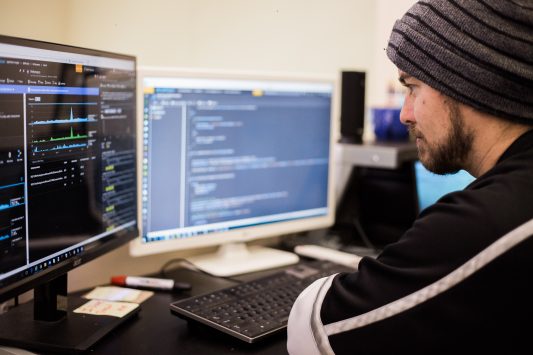How life changed in one moment for this Marine
At age 18, Marine Corporal Andrew Richardson was serving in Iraq. His squad maintained a perimeter around a medical sanctuary where local civilians could get treatment. Doing so gave Richardson an overwhelming sense of satisfaction and value.
Returning to civilian life, Richardson struggled to find that same sense of value. For five years he floated from job to job, doing construction and working as a roadie and security guard, among other gigs.
Today, he enjoys a fulfilling career at Microsoft, and has discovered a passion for programming — all thanks to a chance encounter while tending bar where he heard about an 18-week tech training and career-development program sponsored by Microsoft.
After leaving the Marines and working odd jobs for five years, Andrew Richardson discovered MSSA by chance and tapped into his passion for programming.
You talked about how Marines are scared to be civilians. What keeps you up at night?
When you’re deployed, when you wake up in the morning you have three primary things on your mind: what you’re going to eat, where you’re going sleep and whether you’ll get to do both of those things that day. All the other stuff isn’t even relevant.
In civilian life, when you wake up you’re faced with these seemingly unimportant and innumerable tasks that, taken as a whole, can be ovewhelming — everything from have I walked my dog and did I remember to go to the grocery store to remembering to pay my bills on time. Honestly, it seems like much more of a burden than having one or two massive responsibilities like taking care of yourself and taking care of the person on your right and left.
When you deployed, what things of value did you carry? Today, what do you carry?
My best friend was my M16A4 with grenade launcher. That was definitely the No. 1 item that went with me everywhere. On a typical mission I also carried around 300 rounds of ammo, along with a variety of grenades, night vision goggles, my KA-BAR knife, flares, GPS, radio, Kevlar vest and 9mm Beretta. Together it was roughly 120 pounds of gear.
Along with that, I always had my eyeglasses and a little sketch pad for emotional release or expression. And after I got out of the Marines, I took the seven or eight sketches that were in my sketch pad and had them tattooed onto my arm. That’s what I carry around in my civilian life that represents something of personal value.
Today? Definitely my Microsoft blue badge for starters. The day they gave me my blue badge was like that scene from “Wayne’s World” where Wayne and Garth are so proud of their backstage passes and hold them up for all to see. When I got my badge, I just wanted to show everyone that I worked here and belonged here.

Tell about your experience in Microsoft Software & Systems Academy (MSSA).
Before MSSA, I had no idea there was this correlation between programming and math. I became obsessed and spent hours and hours writing my own code. I also enjoyed being surrounded by Marines again. If it hadn’t been for fellow military, I probably wouldn’t have enjoyed MSSA as much, and probably wouldn’t have succeeded. The fact that MSSA is for the military, it’s great for transition because it kind of pulls you out of your Marine mindset — but not too abruptly.
How did MSSA prepare you?
It gave me a great intro into IT — shotgun blasting, if you will. I got to see a little bit of everything, whether it be programming in different languages or networking; just different areas of IT.
How did your job interviews go?
When I showed up the morning of the interview, I was so nervous I was dry heaving in the parking lot. I thought my first interview went well, but by the end of the day I felt defeated, thinking there was no way [I’d get the job]. When I got a call the next morning, I was jumping up and down on my hotel bed, freaking out.
How has your life changed since then?
How much time do you have? [laughs] My life has changed in so many ways. The city I live in is my favorite. I have a great apartment, and I’m able to help my family out. My quality of life has definitely improved.
Why should companies offer programs like MSSA for veterans?
I think companies underestimate military members’ desire to contribute to a bigger cause. Some things you can’t learn in school. Some of those values are innate to members of the military or have been ingrained in them.
And if you give military members a chance when we may feel like we don’t deserve it, then we spend every moment trying to prove that we do deserve it, that we do appreciate it.
What is it like working at Microsoft?
I’ve never had a job before where I sat in a room with a bunch of people who were so smart. Of course, you have the geeks that you would expect at a tech company, but I think there’s a general misconception about who works in IT. One of the things I’ve noticed within Microsoft is how they encourage individuality. Everyone has different passions, and dresses different, has different cultures.
It’s the only job I’ve ever had where I can show my tattoos. I can wear what I want to wear, as long as it’s not offensive to anyone. I can do whatever I want as long as I’m performing. You’re not only allowed but encouraged to be yourself. I love it.

Any advice for service members about civilian life?
Don’t assume that anything is going to be given to you. We’re not special, in a sense. There’s a certain arrogance that I think most military members possess — and we kind of have to with our jobs. Knocking that chip off your shoulder before returning to the civilian world helps a lot.
